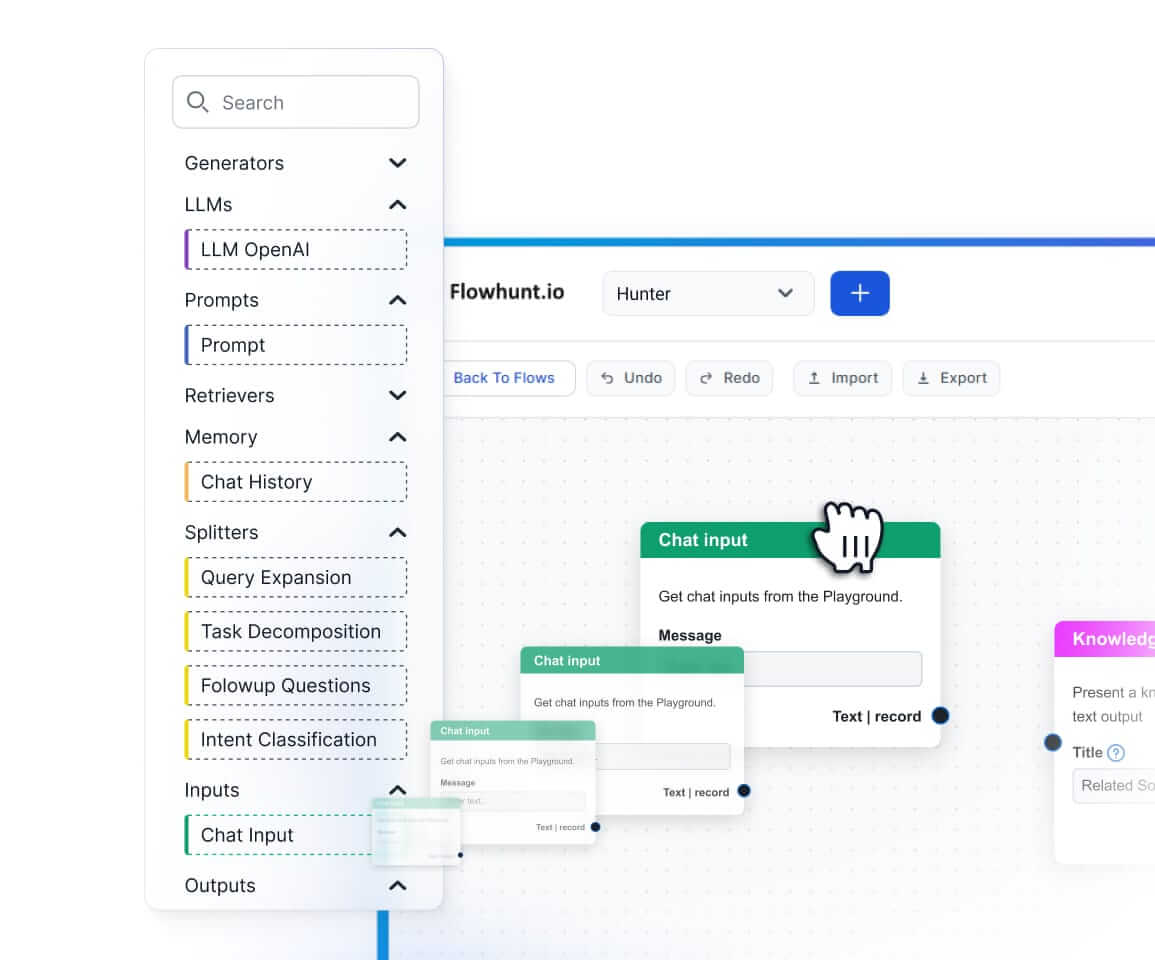
Agentic RAG: The Evolution of Intelligent Retrieval-Augmented Generation
Discover how Agentic RAG transforms traditional retrieval-augmented generation by enabling AI agents to make intelligent decisions, reason through complex probl...
Agentic RAG (Agentic Retrieval-Augmented Generation) is an advanced AI framework that integrates intelligent agents into traditional RAG systems, enabling autonomous query analysis, strategic decision-making, and adaptive information retrieval for improved accuracy and efficiency.
Agentic RAG integrates intelligent agents into traditional RAG systems to enhance information retrieval by enabling autonomous query analysis and strategic decision-making. It’s used for real-time adaptive query responses, automated support, and internal knowledge management.
Agentic Retrieval-Augmented Generation (RAG) is an advanced AI framework that integrates intelligent agents into the traditional RAG system. Traditional RAG combines large language models (LLMs) with external knowledge sources to enhance the accuracy of responses by providing additional context to the LLM. Agentic RAG builds on this foundation by enabling AI agents to autonomously analyze queries, make strategic decisions, and perform multi-step reasoning. This approach allows systems to manage complex tasks across diverse datasets, bringing a dynamic and flexible approach to information retrieval.

Agent use Document Retriever and decides if the document is relevant to the input query
Agentic RAG is primarily used to improve the efficiency and accuracy of complex information retrieval tasks. By employing AI agents, it goes beyond static, rule-based systems and introduces intelligent, adaptive frameworks capable of real-time planning and execution. These agents can leverage multiple data sources, external tools, and APIs to retrieve, evaluate, and synthesize information, thereby providing more comprehensive and context-aware responses.
Agentic RAG ensures that both employees and customers receive accurate information promptly, enhancing productivity through efficient data management.
By providing quick and precise answers to inquiries, agentic RAG reduces the workload on human agents, resulting in improved efficiency and response times.
Agentic RAG streamlines access to crucial information within organizations, aiding employees in making informed decisions swiftly and efficiently.
The system assists in synthesizing and presenting relevant data for strategic initiatives, supporting innovation and research efforts.
Agentic RAG systems can be built using language models with function calling capabilities. This approach allows the models to interact with predefined tools, enabling them to access and cite web resources, execute code, and more.
Frameworks like FlowHunt, DSPy, LangChain, and CrewAI provide pre-built templates and tools to simplify the construction of agentic RAG systems. These frameworks facilitate the integration of multi-agent systems and external resources, enhancing the system’s adaptability and efficiency.
We need to give to agent a tool, which will grade the document found in the indexed Documents. Here is example prompt to classify found document and deciding if the document answer the question of user. Based on this decission can Agent rewrite his search prompt and search again.
You are a grader assessing relevance of a retrieved document to a user question.
---
Retrieved document:
{context}
---
User question: {question}
---
If the document contains keyword(s) or semantic meaning related to the user question, grade it as relevant.
Give a binary score 'yes' or 'no' score to indicate whether the document is relevant to the question.
Agentic RAG continues to evolve with advancements in AI technologies. Trends include multi-modal retrieval, cross-lingual capabilities, and enhanced natural language processing bridges human-computer interaction. Discover its key aspects, workings, and applications today!"), which promise to expand the applicability and effectiveness of agentic RAG systems across various industries.
In summary, agentic RAG represents a leap forward in AI-driven information retrieval, offering a sophisticated approach to managing complex queries and enhancing decision-making processes. Its ability to adapt, reason, and utilize external knowledge positions it as a powerful tool for organizations dealing with large-scale, dynamic information environments.
RAG-DDR: Optimizing Retrieval-Augmented Generation Using Differentiable Data Rewards
Published: 2024-10-17
This paper discusses the optimization of Retrieval-Augmented Generation (RAG) systems to reduce hallucinations in Large Language Models (LLMs) by employing a Differentiable Data Rewards (DDR) method. The study highlights the limitations of traditional supervised fine-tuning (SFT) methods which may cause RAG modules to overfit and neglect the varying data preferences among agents. The DDR method enhances RAG systems by aligning data preferences and optimizing agents to produce better outputs, ultimately improving RAG system performance. The experiments show DDR’s significant effectiveness over SFT, especially for smaller-scale LLMs dependent on retrieved knowledge. The research also demonstrates DDR’s superior ability to align data preferences between RAG modules, enhancing the generation module’s efficacy in information extraction and mitigating conflicts. Read more
.
A Study on the Implementation Method of an Agent-Based Advanced RAG System Using Graph
Published: 2024-09-13
This study explores enhancing knowledge-based QA systems by implementing an advanced RAG system using Graph technology, overcoming limitations of existing models. The research addresses the shortcomings such as accuracy degradation and inability to incorporate real-time data in traditional RAG systems. By utilizing LangGraph, the study enhances the reliability and synthesis of retrieved data for more accurate responses. The paper provides detailed implementation steps and guidelines, making it a practical resource for deploying advanced RAG systems in corporate environments. This approach is aimed at improving the contextual understanding and reducing biases in RAG outputs.
Optimizing RAG Techniques for Automotive Industry PDF Chatbots: A Case Study with Locally Deployed Ollama Models
Published: 2024-08-12
The paper presents a case study on optimizing RAG techniques for offline PDF chatbots in the automotive industry, focusing on deploying LLMs in low-performance local settings. The study addresses the challenges of processing complex industry-specific documents and enhancing information retrieval and generation capabilities. It showcases the successful application of optimized RAG techniques in creating efficient and reliable chatbots for industrial environments, highlighting the potential for improving information management in production settings. The findings suggest significant improvements in chatbot performance and user satisfaction through tailored RAG implementations.
Agentic RAG is an advanced AI framework that integrates intelligent agents into traditional Retrieval-Augmented Generation systems, enabling autonomous query analysis, strategic decision-making, and adaptive, multi-step reasoning for improved information retrieval.
Agentic RAG uses AI agents to autonomously analyze queries, plan retrieval steps, evaluate data source reliability, and synthesize information, resulting in more accurate, context-aware, and comprehensive responses than static rule-based systems.
Common use cases include real-time adaptive query responses, automated support systems, internal knowledge management, and research and innovation support across various industries.
Frameworks like FlowHunt, DSPy, LangChain, and CrewAI offer pre-built templates and tools for constructing agentic RAG systems, facilitating integration of multi-agent networks and external resources.
Emerging trends include multi-modal retrieval, cross-lingual capabilities, and enhanced natural language processing, expanding the applicability and effectiveness of agentic RAG systems across industries.
Experience the power of agentic RAG for smarter, adaptive information retrieval and automated support. Build your own AI flows today.

Discover how Agentic RAG transforms traditional retrieval-augmented generation by enabling AI agents to make intelligent decisions, reason through complex probl...

Retrieval Augmented Generation (RAG) is an advanced AI framework that combines traditional information retrieval systems with generative large language models (...

Discover the key differences between Retrieval-Augmented Generation (RAG) and Cache-Augmented Generation (CAG) in AI. Learn how RAG dynamically retrieves real-t...
Cookie Consent
We use cookies to enhance your browsing experience and analyze our traffic. See our privacy policy.